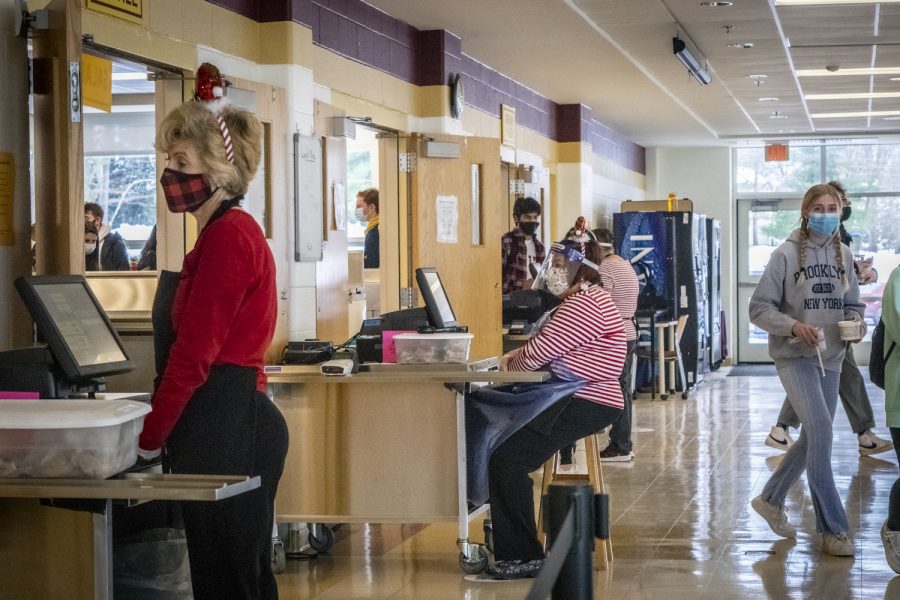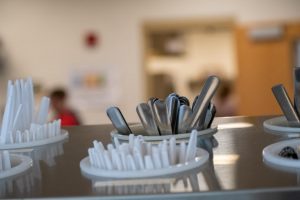National grant provides free lunches but cafeteria needs more appetites
All students qualify for free meals provided by the cafeteria through a national grant. Student participation is necessary for the success of this grant as the more meals the cafeteria can distribute, the higher the opportunity to gain profit.
January 11, 2021
Because of the school district’s participation in a national grant, there is such a thing as a free lunch at Algonquin this year; however, many students are not taking advantage of the free meals they are all entitled to.
All students automatically qualify for free meals, breakfast and lunch, on the days they are physically in school. In addition, after being approved by the state to become an open sight, Algonquin, Trottier and Melican have all opened for anyone up to the age of 22 to get a free lunch. This is not only for in person days but remote as well. Students or parents can sign up on the Algonquin homepage to pick up frozen meals on Monday from 11 a.m. to 1 p.m. that will provide at home lunches for the week.
“On Monday you can come by and pick up meals for the all remote days off; the only thing we are asking people to sign up for are those remote days,” the district’s Director of Operations, Kieth Lavoie, said. “When you’re in school all you gotta do is get in line.”
Even though receiving lunch is just as easy as getting in line, a Harbinger survey of 262 students conducted through Google Forms from Dec. 7 to Dec. 12, showed that only 39% percent of students have gotten a free lunch this year.
“Our percentages [of students getting lunches] are actually down this year and the reason for this I am not sure why,” Algonquin Food Services Manager Diane Cofer said.
The food services are run solely on the revenue they receive. The cafeteria is not part of the school’s budget and requires participation from students in order to remain financially stable.
“With having students in the building it is important to make sure we have enough incoming funds to make all of our hard working cafeteria workers stay fully staffed,” Principal Sean Bevan said.
For every meal served the government reimburses the food services $3.65. This income makes it beneficial for the cafeteria to have a large number of students getting lunches. The more lunches that are distributed the higher opportunity there is to gain profit.
“The financial impact is very high because we lost half the students we would have in a day added on to the lower percentage of people receiving lunch,” Cofer said.
Regardless of the low numbers at Algonquin, the number of meals given out to students at the elementary and middle schools has increased in percentages throughout the school year.
“We are now serving more meals per day than we did pre-COVID. It didn’t start that way but it has gradually increased to that point,” Lavoie said.
Free breakfast is available in the mornings for anyone who wants or is in need of it. Cereals, breakfast sandwiches and juices are just some of the menu items.
“An option for breakfast is part of the national program and we thought we should take advantage of it because there are a lot of students who are in need of breakfast,” Cofer said.
Although breakfast is offered to everyone in the cafeteria, participation in the breakfast program is very low. According to the Harbinger survey, 91% of students said that they have not received a free breakfast at the school.
“I think that if they park a cart with food on it near the entrances by the gym, people coming in right before school [would] see the food and probably take it, whereas in the cafeteria it is out of sight and far away,” senior Tyler Beauchesne said.
Student participation is a key component to the success of the grant; however, Lavoie, Cofer and administration stress the main object of the grant is to help ensure nutritious meals for all who need them, especially those affected by the pandemic.
“The goal of the grant is to provide greater relief for students and families that may be struggling with the pandemic all around the country and to make sure that students are not going without proper nutrition,” Bevan said.
Lavoie urges anyone who may not be able to get to the school to receive a free lunch to reach out and email him at klavoie@nsboro.k12.ma.us to set up delivery.
“If there is anyone in need please reach out,” Lavoie said. “Oftentimes parents are working and can not get to the school during the day Monday. I have parent volunteers willing to help out and deliver food if needed.”
Cofer also encourages students to give feedback on how to improve lunches and their program.
“We want this program to succeed and we welcome any questions or feedback you may have,” Cofer said. “We only hear about what is happening from our side of the school, so in order to make any real changes we need to hear from you.”













